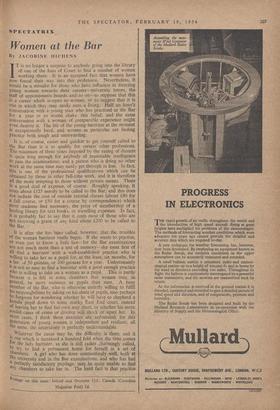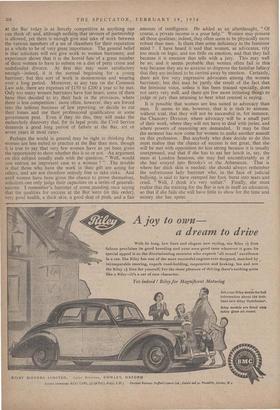Women at the Bar
By JACOBINE HICHENS
It is no longer a surprise to anybody going into the library of one of the Inns of Court to find a number of women working there. It is an accepted fact that women have now found their way into the profession. Nevertheless, it would be a mistake for those who have influence in directing young women towards their careers - university tutors, the staff of appointment boards and so on - to suppose that this is a career which is open to women, or to suggest that it is one in which they may easily earn a living. Half an hour's conversation with a woman of comparable experience might even destroy it. The life of the young barrister at the moment is exceptionally hard, and women in particular are finding practice both tough and unrewarding.
It is, of course, easier and quicker to get yourself called to the Bar than it is to qualify for certain other professions. The minimum of three years imposed by the eating of dinners is quite long enough for anybody of reasonable intelligence to pass the examinations; and a person who is doing no other work at the same time may easily get through in less. In fact, this is one of the professional qualifications which can be obtained by those in other full-time work, and it is therefore all the more tempting to those without private means. There is a good deal of expense, of course. Roughly speaking, it costs about £125 merely to be called to the Bar; and this does not include the cost of outside tutorial classes (about £80 for a full course, or £50 for a course by correspondence) which most students find necessary, the price of membership of a lending library for text books, or travelling expenses. In fact, it is probably fair to say that it costs most of those who are not receiving a grant of any kind about £200 to be called to the Bar.
It is after she has been called, however, that the troubles of the woman barrister really begin. If she wants to practise, or even just to know a little law — for the Bar examinations are not much more than a test of memory — she must first of all find a barrister with a well-established practice who is willing to take her as a pupil for, at the least, six months, for a fee of 50 guineas, or 100 guineas for a year. Unfortunately it is not so easy to find a barrister with a good enough practice who is willing to take on a woman as a pupil. This is partly because it is felt in some chambers that women may, in general, he more nuisance as pupils than men. A busy Member of the Bar, who is otherwise entirely willing to fulfil his responsibilities by taking on his share of pupils, may perhaps be forgiven for wondering whether he will have to shepherd a female pupil down to some murky East End court, instead of leaving her to find her own way there, or whether his more sordid cases of crime or divorce will shock or upset her. In most cases, I think these anxieties are unfounded, for this generation of young women is independent and resilient; all the same, the uncertainty is perfectly understandable.
Whatever the cause may be, the difficulty is there, and it is one which is increased a hundred fold when the time comes for the lady barrister, as she is still rather charmingly called, to try to find a permanent home for herself in a set of chambers.
A girl who has done outstandingly well, both at the university and in the Bar examinations, and who has had a perfectly satisfactory pupilage, may be quite unable to find any chambers to take her in. The hard fact is that practice at the Bar today, is as fiercely competitive as anything one can think of; and, although nothing, that savours of partnership is allowed, yet there is enough give and take of work between the various members of a set of chambers for their reputation as a whole to be of very great importance. The general belief is that solicitors will not give work to women barristers; and experience shows that it is the horrid fate of a great number of these women to have to subsist on a diet of petty crime and undefended divorce. At first this may seem satisfactory enough—indeed, it is the normal beginning for a young barrister; but this sort of work is monotonous and wearing over a long period. Moreover, at any rate on the Common Law side, there are expenses of £150 to £200 a year to be met. Only too many women barristers have lost heart; some of them have then decided to try their luck in the provinces, where there is less competition: more often, however, they are forced into the tedious business of law reporting, or decide to cut their losses and use their professional qualification in some government post. Even if they do this, they will make the melancholy discovery that, for its legal posts, the Civil Service demands a good long period of failure at the Bar, six or seven years in most cases.
Perhaps the world in general may be right in thinking that women are less suited to practice at the Bar than men, though it is true to say that very few women have as yet been given the opportunity to show whether this is so or not. An argument on this subject usually ends with the question, "well, would you entrust an important case to a woman ?" The trouble is that those who have the work in their gift are acting for others, and are not therefore entirely free to take risks. And until women have been given the chance to prove themselves, solicitors can only judge their capacities on a series of generalisations. I remember a barrister of some standing once saying that the qualities for success at the Bar were (in this order), very good health, a thick skin, a good deal of push, and a fair amount of intelligence. He added as an afterthought, "of course, a private income is a great help." Women may possess all those qualities; indeed, they often seem to be physically more robust than men. Is there then some deficiency in the feminine mind ? I have heard it said that women, as advocates, rely too much on logic, and too little on emotion, and that they fail because it is emotion that tells with a jury. This may well be so; and it seems probable that women often fail in this way because they are so anxious to disprove the familiar fallacy that they are inclined to be carried away by emotion. Certainly, there are few very impressive advocates among the women barristers; but this may be partly the result of the fact that the feminine voice, unless it has been trained specially, does not carry very well, and there are few more irritating things to judge or jury than straining to hear what counsel is saying.
It is possible that women are less suited to advocacy than men. It seems to me, however, that it is rash to assume, without trial, that they will not be successful in, for instance, the Chancery Division, where advocacy will be a small part of their work, where they will not have to deal with juries, and where powers of reasoning are demanded. It may be that the moment has now come for women to make another assault on this profession. But anybody who does decide to do this must realise that the chance of success is not great, that she will be met with opposition no less strong because it is usually unexpressed, and that if she has to eat her lunch in, say, the mess at London Sessions, she may feel uncomfortably as if she had strayed into Brooks's or the Athemeum. That is where her thick skin is needed; she should always remember the unfortunate lady barrister who, in the face of judicial bullying, is said to have stamped her foot, burst into tears and cried, "well, I think it's very unfair." Finally, she must realise that the training for the Bar is not in itself an education, so that if she fails she will have little to show for the time and money she has spent.



































 Previous page
Previous page